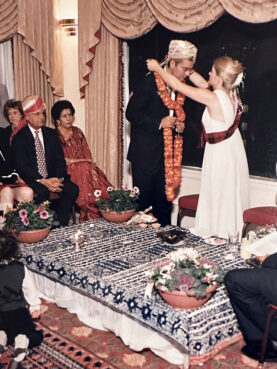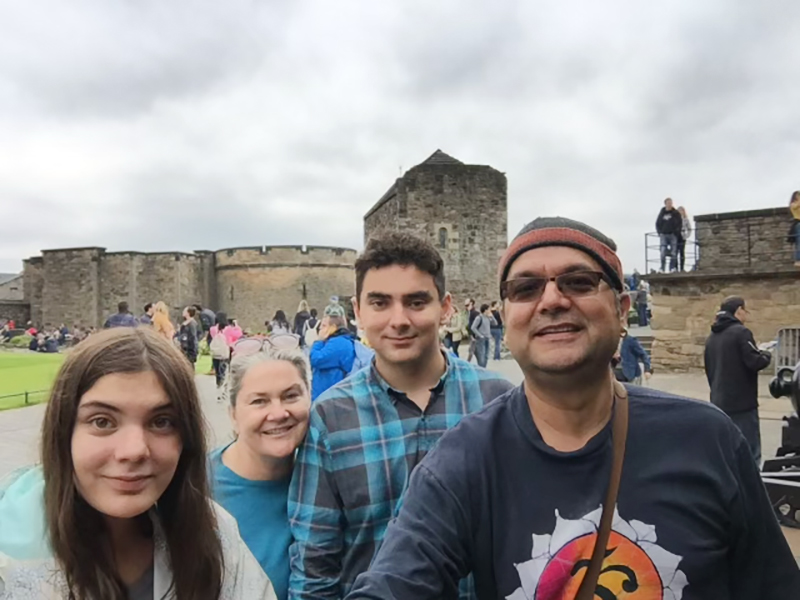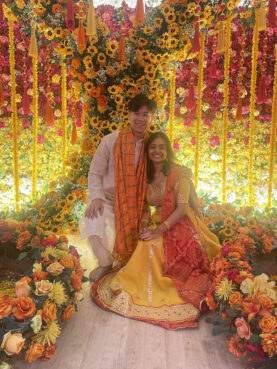(RNS) — When Sinclair Sawhney was introduced to her husband, Deepak, at an art fair 30 years ago, “he was just a ton of fun, really sweet,” she said. “And he was a doctor. But not arrogant!”
The only misgiving, Sawhney recalls, was the warning she got from the friend who set them up: Deepak’s family, the friend said, was “super conservative Indian.”
“I’m like, ‘I don’t even know what that means,’” said Sawhney, a European American who grew up attending Methodist and Presbyterian churches with her family in Southern California.
She would come to find out. As the two sent out their wedding invitations after two years of whirlwind romance, Deepak finally told his parents about her, interrupting his mother’s plan to introduce him to a Hindu woman.
“My mother-in-law said the only thing that gave her hope was that I had a master’s degree and that my parents were still married,” said Sawhney, a former teacher who now writes romance novels. “People told me to my face that interracial marriages never worked out, that they would never let their kids marry a white person.”

The wedding of Deepak, left, and Sinclair Sawhney blended Indian and Scottish traditions. (Photo courtesy of Sinclair Sawhney)
Sawhney credits her in-laws with the dialogue that appears in her series, Misguided Masala Matchmaker, about budding love between Indian couples. The first novel in the series, “A Hard Yes,” echoes her story: An interfaith, interracial couple navigates family expectations and cultures, which ultimately strengthens their love. “I’m not as cool as the protagonist, though,” said Sawhney.
In high school, Sawhney had gone on church missions to Mexico, but by the time she married (in a ceremony that combined Hindu and Christian elements), she had few remaining ties to the church, feeling it had become “conservative, dogmatic and white-oriented.” At the same time, her husband’s Hinduism offered her a whole new world: an endless number of stories, myths, “badass” goddesses and a real philosophy about “how to be the best version of yourself.”
The couple, who now live in Portland, Oregon, found their spiritual sweet spot at Seattle’s Center for Spiritual Living, a community where pluralism, current events and history were taught, and they could blend their traditions in a way that matched their new blended family.
“The world is such a big place and there’s so many different people,” she said. “I think by having two religions, it’s like you’re getting double,” adding that with the perspective of two faiths, “you can accept more people, you can have more empathy. I think you can understand your own place better too.”
The Sawhneys’ daughter, Lakshmi, a 22-year-old college student named for the Hindu goddess of prosperity, surprised some in her hometown of Portland when she stayed in India last summer for a Hindi language immersion.
“I have gone out of my way in my life to travel, learn more about different cultures and people,” Lakshmi said. “The relationships I’ve forged with people of different religious backgrounds and belief systems has been more satisfying than the relationships I’ve formed with the people who are like me.”

The Sawhney family: Lakshmi, from left, Sinclair, Kiran and Deepak. (Photo courtesy of Sinclair Sawhney)
Interfaith, intercultural or interracial marriage is no longer as taboo as it was when Sinclair and Deepak Sawhney married. Almost 40% of U.S. marriages are between people of two faiths, according to a Pew Research study. Among American Hindus, a survey by the organization Interfaith Shaadi found, 38% marry outside the umbrella of Dharmic faiths — Hinduism, Sikhism, Jainism and Buddhism.
Dilip Amin, the founder of Interfaith Shaadi and director of Peninsula Multifaith Coalition of San Francisco, said nothing in Hindu doctrine prevents its followers from marrying Christians, Muslims or Jews. Since 2006, Amin said, he has counseled more than 1,200 South Asian Americans in interfaith relationships.
“If you want to marry interfaith, and you are very clear about each other’s fundamental understanding of religion, then the rest is beautiful,” said Amin, who is Hindu. “You go to their religious rituals, you perform our rituals …There is more to love.”
The “inherent pluralism” of Hinduism, Amin said, allows for any path to the same God, whether through church, mosque or synagogue. And what’s more, marriage to a Hindu requires no formal conversion. When Hindus object to an interfaith marriage, he added, it is often based on tradition or culture rather than religion.
“Hindu parents resist, not based on fundamental scripture beliefs, but just their social fabrics and prejudice,” he said. “But we are coming to this stage where it’s just about time that people will have to accept this reality.”
Hindu doctrine, said Amin, also has no quarrel with raising children in two faiths.
With Lakshmi’s older brother, Kiran, a practicing Christian, the Sawhney family celebrates Christmas and Diwali every year. The freedom to choose and adapt, said Lakshmi, has influenced her life in every way. “I felt very lucky growing up. I felt like both of my parents had already healed generational trauma and had gone outside of their culture. I appreciate that they did something more unorthodox.”

David Choo and Anica Bhargava. (Photo courtesy Anica Bhargava)
Anica Bhargava, a 25-year-old New Yorker raised in a Hindu family, said her family’s biggest question about her boyfriend of seven years, David Choo, was not about his faith but whether he was kind. “My grandma’s only concern was like, if I’m gonna wear a white dress, or a red dress to the wedding,” said Bhargava. “That was where her mindset went to: more rooted in tradition than the actual religious aspect of these things.”
The couple met more resistance from Choo’s side, a highly religious Malaysian Christian family who were hesitant about their son dating a non-Christian. Bhargava, though not deeply religious, found herself defending Hinduism’s multiple gods and mythologies against Choo’s parents’ attempts to convince her of the benefits of finding Christ.
“That was a very interesting time to kind of reflect on what it means for me to be Hindu,” said Bhargava, whose parents were the first in their families to marry outside their castes. “I think I stuck to the identity simply because I was afraid if I didn’t have one, I could easily be told something else.”
Despite tricky discussions about two wedding ceremonies or “what their Sundays are going to look like,” Bhargava said no couple can be sure that their faith will be passed on to the next generation. “There’s no guarantee that the child will become the Christian person you want them to be.”
Like Sawhney, Bhargava said that being exposed to another faith has helped her grow. “It’s a way to see the world from two different perspectives, and to kind of broaden how you live your life and the principles you get to embody every day,” said Bhargava. “To hold on to faith as a reason to be or not be with somebody … you’re just gonna miss out on someone amazing, because there’s so much to offer out there.”
Interfaith marriage has not had a happy ending for some Hindus.
Raj Yerasi, a Los Angeles native now divorced from his Reform Jewish wife, regrets not talking through the specifics of how to raise their children in two faiths. Having made a “broad-brush commitment to raising them interfaith,” the couple got into a legal wrangle over how their two kids would split time between Jewish Sunday school and meditation classes at a Vedanta center. In the end, a judge decided.
But Yerasi said his children, who have both biblical and Hindu names, have gotten a “richer experience,” reading Jewish children’s books alongside the Amar Chitra Katha, a popular Hindu mythology series.
“You don’t have to believe everything about a religion,” said Yerasi. “You don’t even have to believe anything. The point of religion, in my view, should be to bring you greater happiness. There are great things about the Jewish culture and great things about the Hindu culture. They can iterate on that and make it their own.”
According to Amin, who counseled Yerasi through his divorce, young people getting into interfaith marriages “want true pluralism” but are often derailed by institutional doctrine, whether it is baptism, conversion or even circumcision. “People with religious faith are not the problem, it’s the religious institutions,” he said. “It’s the rabbis, pundits, imams: They are the ones messing up your life. Keep all of them out and live your life the way you think it should be.”
What’s most important, he advises couples, is talking about everything, including divorce, early on, to ensure they agree about religion’s role in their daily lives.
Yerasi agrees, saying he hopes his story will be a lesson to the next generation of interfaith couples. “There’s plenty of successful interfaith couples, and there are plenty of unhappy couples who have the same religion,” he said. “So finding the right person is the most important thing.”